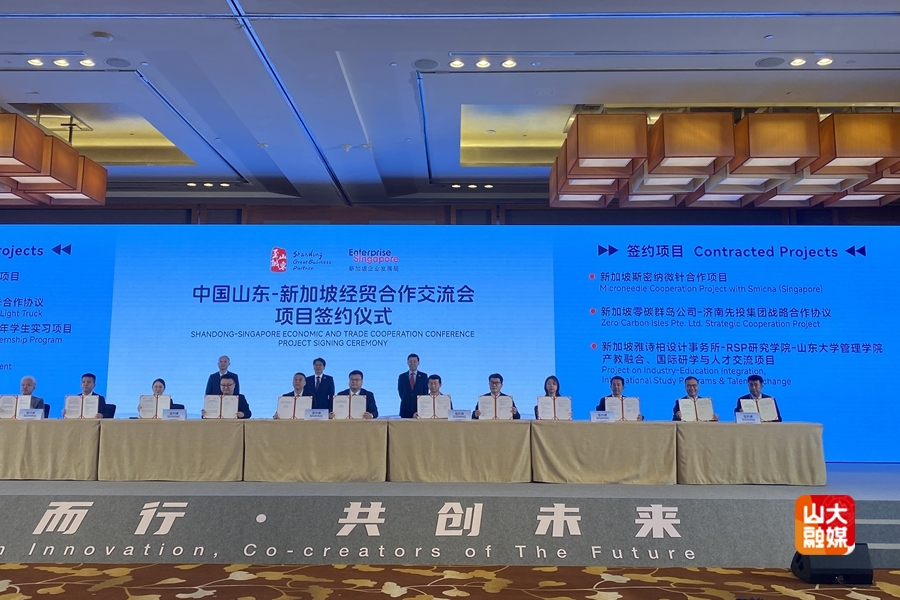On September 17, the School of Management, Shandong University, signed a strategic framework Memorandum of Understanding (MOU) with Singapore's RSP Architects Planners & Engineers (RSP).

The signing ceremony took place during the Shandong-Singapore Economic and Trade Exchange Conference and the opening ceremony of the 2025 Shandong Week in Singapore. Centered around the theme "Forward with Innovation, Creating the Future Together," the event aimed to discuss new measures and visions for exchange and cooperation between the two regions. By enhancing mutual understanding and leveraging complementary strengths, the conference sought to promote high-quality, coordinated development. Present at the event were representatives from the Shandong Provincial Development and Reform Commission, the Shandong Provincial Department of Industry and Information Technology, and local governments of Jinan, Qingdao, and Yantai. Together with their Singaporean counterparts, they conducted thematic presentations on key areas including green and low-carbon high-quality development, artificial intelligence, the China-Singapore Jinan Future Industry City project, shipping and trade cooperation, and clean energy empowerment for industries. Simultaneously, 18 key cooperation projects were signed on-site, spanning sectors such as new energy, cultural tourism, modern finance, higher education, healthcare, high-end equipment, and new materials, injecting strong momentum into comprehensive Shandong-Singapore collaboration.
The School of Management and RSP will focus on three key areas to advance their cooperation. First, they will establish a close partnership for the construction of interdisciplinary industry-education integration mechanisms, and jointly build an interdisciplinary platform for eco-city research and study and management discipline based on the "regular collaboration" model. Second, relying on RSP’s resources in green low-carbon development and metaverse digital space, as well as the School of Management’s "four-chain integration" strategy, they will develop an integrated industry empowerment model of "ecological environment + urban governance". They will launch customized training courses, with supporting modules for industrial research & study and continuing education, to simultaneously serve the talent upgrading of enterprises and the practical skill improvement of students. Third, they will conduct cooperation and exchange with Singaporean universities, organize China-Singapore study camps on urban environmental and ecological management, jointly research topics on eco-city development, and invite overseas experts to the campus. These efforts aim to broaden students’ international awareness and support the global development of young talents.
Against the backdrop of the era of comprehensively deepening cooperation between Shandong and Singapore, this signing represents not only a complementary synergy between a higher education institution and a specialized industry firm but also a significant breakthrough in cross-sectoral resource integration between the two regions. Both parties will use this as a starting point to continuously promote interdisciplinary innovation practices, high-quality industry development, and the cultivation of international talents, contributing more practical outcomes and developmental momentum to Shandong-Singapore and broader China-Singapore cooperation.
RSP is one of the oldest and most accomplished architecture, planning, and engineering design firms in the Asia-Pacific region. It has witnessed and participated in the entire course of Singapore's national development, making outstanding contributions to the country. Headquartered in Singapore, RSP has 16 offices globally with over 1,200 professionals. RSP is dedicated to enriching and enhancing people's lives through the shaping of the built environment, creating humanistic spaces, and conveying humanistic values. Its research academy, RSP Academy, aims to showcase outstanding achievements from an academic perspective, as well as promote partnerships, industry exchanges, and academic exchanges.